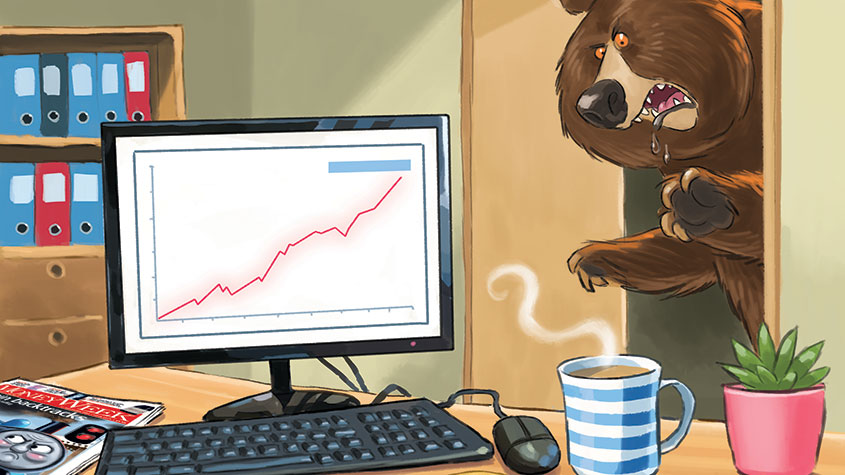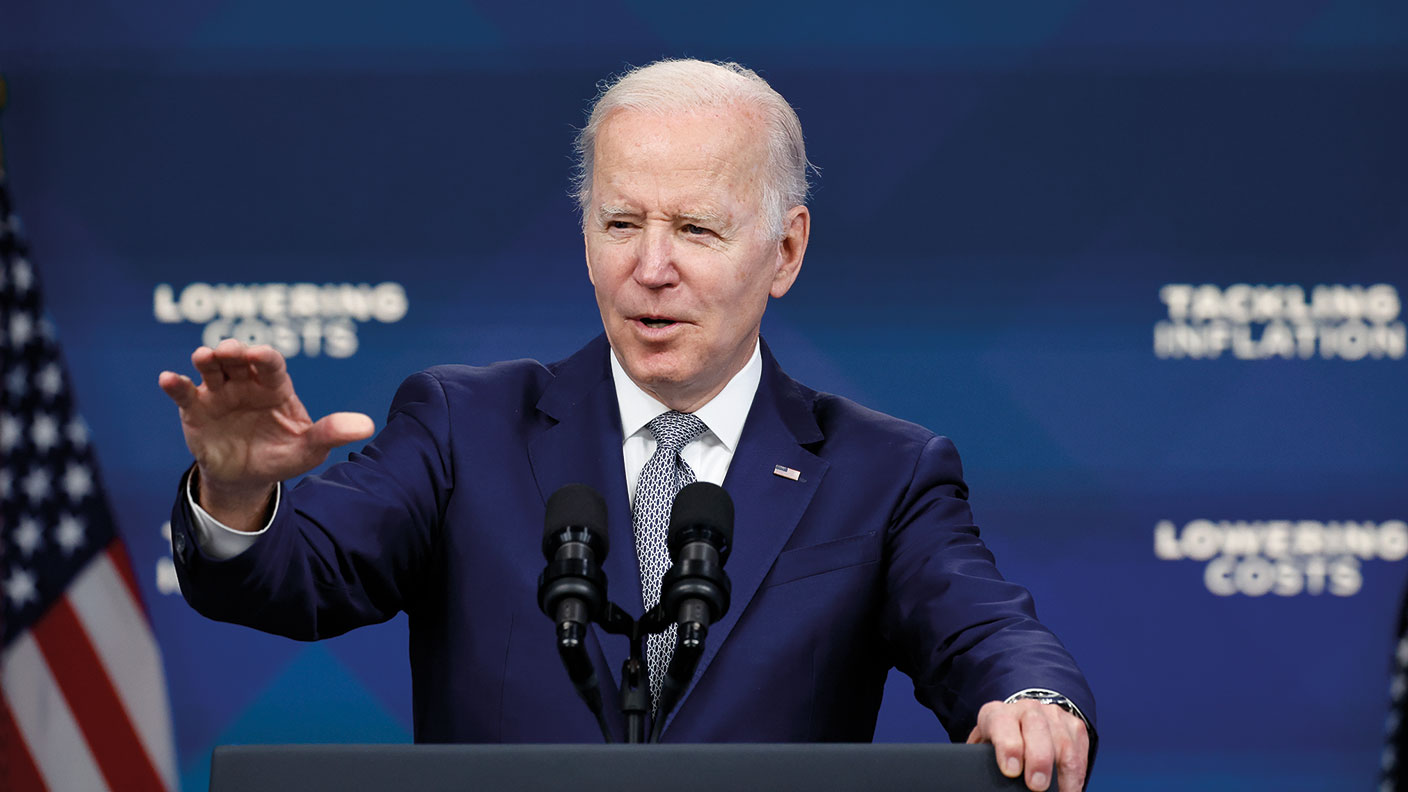Bulls beware: after the melt-up will come the meltdown
Stockmarket bulls should remember that all melt-ups are quickly followed by meltdowns. If you are buying into today’s fast rising markets, do so with care.

Get the latest financial news, insights and expert analysis from our award-winning MoneyWeek team, to help you understand what really matters when it comes to your finances.
You are now subscribed
Your newsletter sign-up was successful
Want to add more newsletters?

Twice daily
MoneyWeek
Get the latest financial news, insights and expert analysis from our award-winning MoneyWeek team, to help you understand what really matters when it comes to your finances.

Four times a week
Look After My Bills
Sign up to our free money-saving newsletter, filled with the latest news and expert advice to help you find the best tips and deals for managing your bills. Start saving today!

Are global equity markets on the edge of a melt-up? Blackrock's Larry Fink (of whom I don't entirely approve see my post here) seems to think so.
Too many people have been too pessimistic about markets, he says. But as it becomes increasingly obvious that the global economy is in perfectly reasonable shape, with the Chinese economy in particular still growing nicely, they (and their money) will be back, something that could push markets even higher than they are already.
It is worth remembering, however, that rising markets are not just about mildly healthier-looking economic indicators. They might not be about them at all: there is very little historical correlation between GDP growth, which is an almost meaningless number anyway (see Max King's analysis for more on this), and stockmarket returns. But they are definitely about monetary policy.
MoneyWeek
Subscribe to MoneyWeek today and get your first six magazine issues absolutely FREE

Sign up to Money Morning
Don't miss the latest investment and personal finances news, market analysis, plus money-saving tips with our free twice-daily newsletter
Don't miss the latest investment and personal finances news, market analysis, plus money-saving tips with our free twice-daily newsletter
At the end of last year the central bank chat was very much about quantitative tightening (QT) and rising interest rates. No more. In China the state-controlled banking system has been increasing the flow of credit; in the UK we know that rates won't rise at least until Brexit is semi-sorted; and this week the Bank of Canada left its interest rate unchanged at 1.75% for the fourth time in a row and crucially dropped a reference to future rate rises that had been in every statement since late 2017. Finally, possibly most importantly, in February, the US Federal Reserve made it clear that it was soon to end QT.
The "Fed put" the confidence-enhancing idea that the central bank will always intervene to protect equity markets is back. If you believe that quantitative easing (QE) created our bull market in the first place and hence that QT corrected it late last year, the fact that the end of QT has prompted yet another new high from the S&P 500, despite the fact that valuations in the US are already bizarrely high, will come as no surprise. The path of least resistance, says Robin Wiggleworth in the Financial Times, appears to be up.
With that in mind a flick through the magazine this week will give you some interesting investment ideas. In our cover story, I look at the agricultural sector: it has been undisrupted for some decades but is about to see serious change. I'm becoming mildly obsessed with both agri-tech (see also page 19 for a view on how the market will save the planet; agri-tech is part of that) and with the way some farms are returning to what you might think of as very old-fashioned methods of land management with a view to restoring soil health and hopefully yields.
We'd love interesting insights on any of these matters sent to the address below. Meanwhile, David Stevenson looks at the possibility of a 7%-plus yield on a regional real estate investment trust and Richard Beddard analyses an interesting Aim-listed vehicle devices firm.
However, given that stockmarket history is pretty clear on the fact that value wins out in the end (and that on most rational measures there is precious little of it about today), bulls should remember that all melt-ups are fast followed by meltdowns. If you are buying into today's fast rising markets, do so with care.
Get the latest financial news, insights and expert analysis from our award-winning MoneyWeek team, to help you understand what really matters when it comes to your finances.

-
 Average UK house price reaches £300,000 for first time, Halifax says
Average UK house price reaches £300,000 for first time, Halifax saysWhile the average house price has topped £300k, regional disparities still remain, Halifax finds.
-
 Barings Emerging Europe trust bounces back from Russia woes
Barings Emerging Europe trust bounces back from Russia woesBarings Emerging Europe trust has added the Middle East and Africa to its mandate, delivering a strong recovery, says Max King
-
 What to do as the age of cheap money and overpriced equities ends
What to do as the age of cheap money and overpriced equities endsEditor's letter The age of cheap money, overpriced equities and negative interest rates is over. The great bond bull market is over. All this means you will be losing money, says Merryn Somerset Webb. What can you do to protect yourself?
-
 Investors are bullish – but be very careful
Investors are bullish – but be very carefulEditor's letter Many investors are buying the dip, convinced the latest upswing is the start of a new bull market. The odds are that it’s not, says Andrew Van Sickle. The bear has unfinished business.
-
The MoneyWeek approach to investing
Editor's letter At MoneyWeek, our aim is simple: to give you intelligent and enjoyable commentary on the most important financial stories, and tell you how to profit from them. So how do we do that?
-
 Celebrity bitcoin ads echo the subprime mortgage crisis
Celebrity bitcoin ads echo the subprime mortgage crisisEditor's letter A wave of ads featuring celebrities punting crypto to the masses are reminiscent of how low income Americans were encouraged to take on loans they couldn’t afford, says Merryn Somerset Webb.
-
 Will the UK's property slowdown turn into a house-price crash?
Will the UK's property slowdown turn into a house-price crash?Editor's letter As the cost-of-living crisis intensifies and interest rate rise, it is hard to see reasons for UK house prices to keep rising, says Merryn Somerset Webb.
-
 The unintended consequences of ESG investing
The unintended consequences of ESG investingEditor's letter Many people are refusing to invest in energy companies, citing "ESG" concerns. But we still need fossil fuels, says Merryn Somerset Webb, and will for years to come. Boycotting the sector is a bad idea.
-
 What sardines can teach investors about today's markets
What sardines can teach investors about today's marketsEditor's letter A California tale of “eating sardines” and “trading sardines” can help us divide investments into speculative and real, says Merryn Somerset Webb. Something that's very useful when looking at today’s markets.
-
 The market finally seems to be getting it
The market finally seems to be getting itEditor's letter Reality checks are coming fast to the markets, says Merryn Somerset Webb – with even 2022’s safe havens beginning to reflect recession worries.